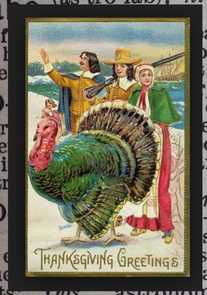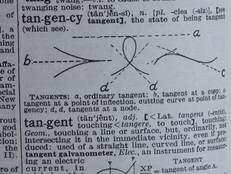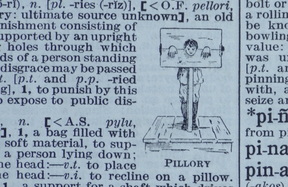Your option was Church of England or nothing, and being an agnostic or atheist was heretical. Heretics were all too regularly burned at the stake.
So when a group of folks wanted to "purify" the Church of England by focusing on reading the Bible and doing good rather than supporting a centralized church, they had limited choices. They could try to reform from inside the church (and keep their heads down!) or they could leave England.
Puritans established a society built on their own religion. The Bible didn't have trial by jury? Well then, neither would New Haven Colony. A sea-captain came home from sea after a few months and greeted his wife with a kiss –– and the Colony government (known as "The Town") stuck them both into stocks for their shameful display of fleshy affection.
The Puritans forbade religious diversity. The Massachusetts Bay Colony put Quakers to death. Quakers! Tortured and hanged, including the Quaker martyr Mary Dyer. Puritans even banned the celebration of Christmas. To be fair, I should note that some Colonies were formed with the spirit of tolerance built right in, like the Rhode Island Colony. Founder Roger Williams not only believed in religious freedom (with no tax dollars!) and he felt that taking land from the Natives without paying for it was not quite morally right. Heartening news, that. So meanwhile, back in Merry Olde England, the religious conflict deepened and developed into the English Civil War, 1642-1652. Oliver "Bad Haircut" Cromwell lead the Roundheads against the Royalists of King Charles I. Cromwell won; Charles was beheaded. There was a short-lived British Republic. Republican rule in England meant that fewer Puritans felt the need to move West. Some early Colonial settlers even shipped back to England in the 1640's and 1650's.
Here are a few of the resources I used in researching this blog:
www.womenofthehall.org/inductee/anne-hutchinson/ www.history.com/news/when-massachusetts-banned-christmas esoterx.com/2015/03/05/the-great-ship-of-new-haven-phantoms-puritan-hippies-and-the-reformation/ dunhamwilcox.net/ct/new_haven1.htm winthropsociety.com/doc_higgin.php winthropsociety.com www.historic-uk.com/HistoryUK/HistoryofEngland/oliver-cromwell/ www.bbc.co.uk/history/historic_figures/charles_ii_king.shtml bcw-project.org/timelines/ www.digitalhistory.uh.edu/era.cfm?eraID=2&smtID=4 avalon.law.yale.edu/17th_century/mayflower.asp www.catholic.com/tracts/the-inquisition thehistoricpresent.com/2008/07/02/why-the-puritans-persecuted-quakers/ www.history.com/topics/mayflower www.bbc.co.uk/religion/religions/judaism/history/350.shtml http://www.history.com/topics/mayflower www.history.com/news/5-things-you-may-not-know-about-the-pilgrims www.historytoday.com/blog/news-blog/geoffrey-robertson/remembering-regicides-350-years
6 Comments
'blunderbuss'
11/22/2016 05:13:40 pm
Just offering up some relaxing words to say ( 'Wampanoag' ) in the event some intellectuals approach Thursday wantin to talk politics at the turkey dinner table. Best while soaking up some 'Narragansett' barley pops.
Reply
Amy
11/24/2016 10:30:16 am
Thank you, blunderbuss.
Reply
ed
11/22/2016 10:10:17 pm
hey, if you come accross any Pickerings or Westgates in your research let me know. Pickering crossed somewhere early 1600.
Reply
Amy
11/24/2016 10:33:01 am
Hey Ed, I will keep an eye out for them...so far, not ringing a bell.
Reply
randy
11/23/2016 02:40:14 pm
religious tolerance did not exist yet...
Reply
Amy
11/24/2016 10:44:00 am
Thanks for that, Randy, though I might amend it to "religious tolerance did not exist in that society yet." I did not know about the Toleration Act of Maryland.
Reply
Leave a Reply. |
About the Blog
A lot of ground gets covered on this blog -- from sailboat racing to book suggestions to plain old piffle. FollowTrying to keep track? Follow me on Facebook or Twitter or if you use an aggregator, click the RSS option below.
Old school? Sign up for the newsletter and I'll shoot you a short e-mail when there's something new.
Archives
June 2024
Categories
All
|



 RSS Feed
RSS Feed
